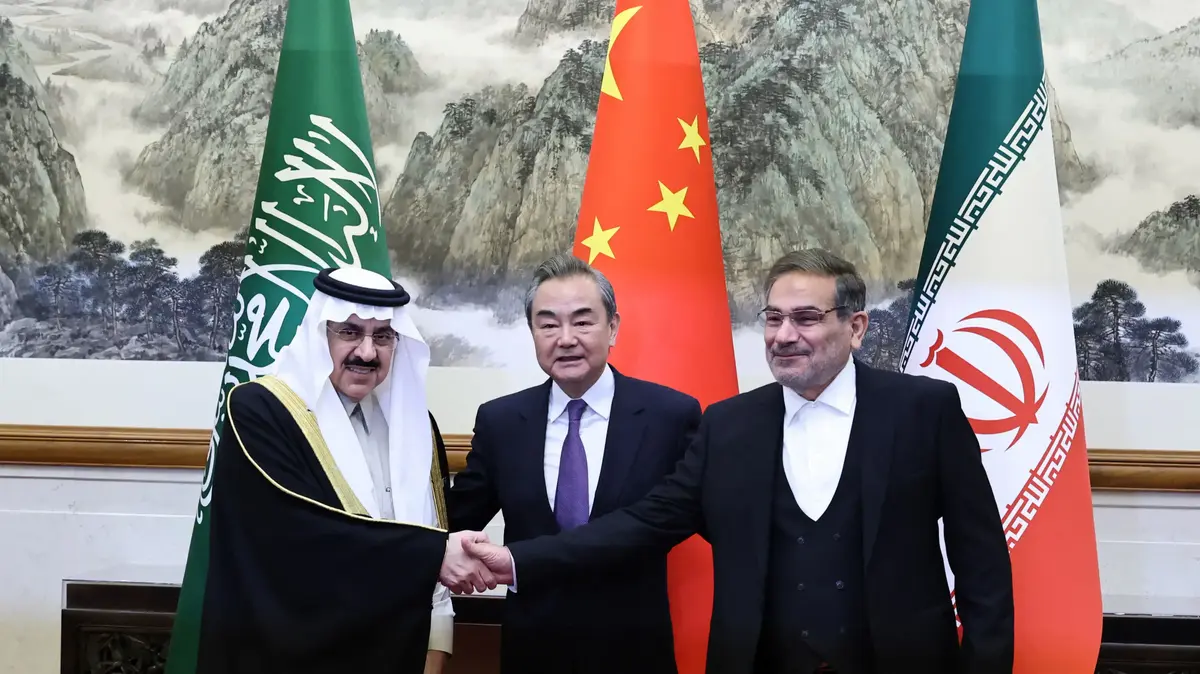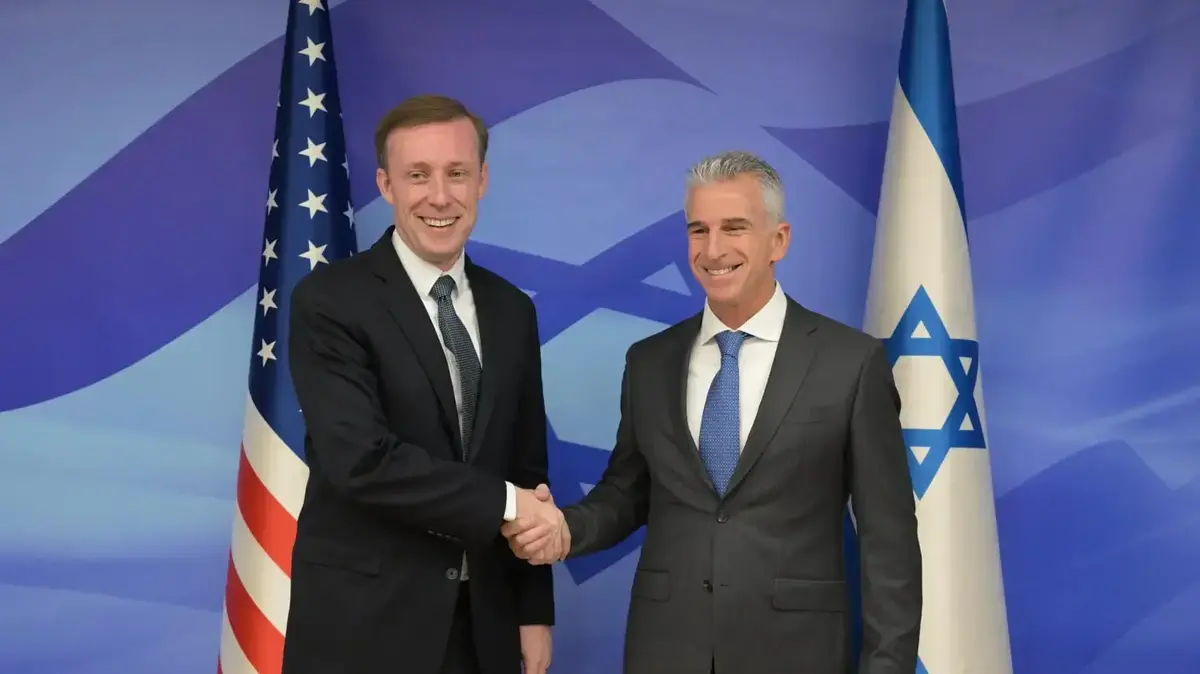In the video: Netanyahu: "My most important task is to stop Iran from obtaining nuclear weapons" (Photo: Roni Kanfo)
Among the most striking things in the reconciliation agreement between Iran and Saudi Arabia was the identity of the mediator.
It was not an Arab or Muslim country, certainly not the United States.
It was distant China, which hosted the decisive round of talks, after about two years of contacts between the two bitter enemies.
Washington, whose influence on the countries of the region has decreased in recent years, was only updated on the talks and was not involved.
Riyadh's decision to choose the diplomatic path with Tehran was made with the change of administration in the United States at the beginning of 2021. The direct channel between Mohammed bin Salman and the White House was closed with the inauguration of Joe Biden in place of Donald Trump, who defended the Saudi prince at the height of the murder of journalist C Mal Khashoggi.
Biden tried to isolate the adventurous crown prince, until he was finally forced to turn to him last summer due to the rampant oil prices following Russia's invasion of Ukraine.
But the visit of the President of the United States to the Saudi Kingdom, to which he flew from Israel, did not lead to a breakthrough.
On the contrary, Saudi Arabia and Russia agreed shortly after to cut oil production, in a decision that was seen as a slap in the face to the democratic president ahead of the congressional elections last November.
The United States would be happy to see Saudi Arabia and Israel publicize their secret ties and expand the Abraham Accords, but bin Salman was unwilling to give such a reward to the Biden administration without far-reaching implications.
Just a few hours before the strain on renewing relations with Iran, the Wall Street Journal revealed the conditions that Saudi Arabia set for the United States in exchange for normalization with Israel: support for the Saudi civil nuclear program and a mutual defense alliance similar to that of NATO.
More in Walla!
"The risk was enormous": behind the operation to eliminate the three terrorists near Jenin
History will recognize Netanyahu as he really is: the destroyer of the Zionist enterprise in an attempt to escape justice
Business owner or entrepreneur?
This is the way to easily get a visa or green card for the USA
The reconciliation agreement will affect the entire region.
The signing ceremony in Beijing, yesterday (Photo: Reuters)
The Saudi crown prince, the de facto leader of the kingdom for many years, knew that these were demands that the current administration could not, and probably did not want to, meet.
Many members of Congress from Biden's party are interested in reducing security ties with Saudi Arabia, in light of its war in Yemen and the suppression of the crown prince's opponents.
And without the American umbrella, which was not given to him even during the Trump era when Iranian drones attacked the oil facilities in the kingdom in 2019, bin Salman chose a diplomatic option with Iran, whose leader he compared more than once to Adolf Hitler and with whom he severed relations in 2016 following an onslaught of Iranian protesters on Saudi missions in response to the execution of a Saudi Shia preacher.
The three countries involved in the agreement have something to gain from it, assuming it actually lasts. Many agreements in history, especially that of the Middle East, were not worth more than the paper they were signed on.
As far as Saudi Arabia is concerned, reconciliation with Iran may promote the end of the war in Yemen that has been going on since 2015. Of the Arab coalition formed by bin Salman at the time against the pro-Iranian Houthi rebels, mainly Saudi Arabia remains, and the fighting in recent years has remained static.
The parties have maintained a cease-fire since last year, although a UN-sponsored agreement expired in October without being renewed, and Riyadh wanted to divert its resources elsewhere. The
end of the war could strengthen Bin Salman's efforts to restore his image and status in the international arena, although under the auspices of the war in Ukraine, he was revived renewed among Western leaders who need alternative sources of energy from those of Russia.
Not waiting for Biden.
Saudi Crown Prince Bin Salman (Photo: Reuters)
For Iran, the agreement will make it less isolated in the region at an important time for the regime, which has experienced violent protests in the last two months and is in a growing crisis with the West due to the acceleration of the nuclear program and support for the war by Russia.
The boycott led by Bin Salman on Tehran since 2016 (which, like the one he imposed on Qatar, did not produce the results he wanted them to) also affected its relations with other countries in the Gulf, and now they too will be able to deepen ties with it as part of the reconciliation process between the countries of the region after many years of conflicts Between blocs in Iraq, Syria, Lebanon, Yemen and Libya.
The Assad regime, which is receiving renewed legitimacy in the Arab world, may benefit from this as well.
The third side of the agreement, China, gains a diplomatic achievement and a foothold in the region.
Most of its oil supply comes from the Middle East, and preventing a war between the two major producers will ensure its continuity.
In addition, it is part of the vision of Chinese leader Xi Jinping to change the global balance of power, which he promotes together with the ruler of Russia, Vladimir Putin.
These are two non-democratic powers, which do not support respect for human rights or free elections.
In the Middle East, and not only there, this kind of unconditional support has many buyers.
The train from Haifa to Riyadh will wait
Ostensibly, the losers from the agreement are the United States and Israel, but not necessarily.
Washington would prefer stability in the region over a possible confrontation with Tehran, although the agreement between it and Riyadh does not touch its nuclear program, which continues to develop at an accelerated pace since Trump withdrew from the nuclear agreement in 2018, encouraged by Benjamin Netanyahu.
The Americans would be happy to see the countries of the Middle East get along among themselves, so that they can focus on containing China and Russia in other arenas.
In Israel, the issue immediately became another point of contention between the coalition and the opposition, with each side blaming the other.
The very opposition to the agreement was seen in Iran as proof of their victory, and one of the senior officials of the regime claimed that the renewal of relations with Saudi Arabia would harm the Israeli plans in the region.
Israel, especially Netanyahu, did put a lot of effort into establishing ties with Saudi Arabia and isolating Iran, but yesterday's agreement did not put an end to them.
The secret relations with Riyadh will continue, and in light of the crisis-filled past with Tehran, it is not known what will happen to the current reconciliation agreement.
A train line between Haifa and Saudi Arabia, which Netanyahu talked about a few hours before the Iranian announcement, will probably not be inaugurated soon, but it is possible that bin Salman will wait in the hope that the Republicans will win the elections next year and for the return of a sympathetic president to the White House in order to reshuffle the cards.
news
world news
the Middle East
Tags
Iran
Saudi Arabia
China
United States




